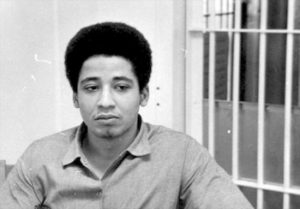
George Jackson
This date marks the birth of George Jackson in 1941. He was a Black activist and felon.
George L. Jackson was born in Chicago, Ill., and moved with his family to Los Angeles at 14. As a teen, he had several juvenile problems, which landed him in trouble with the police and resulted in him spending time in the Youth Authority Corrections facility in Paso Robles, CA. At 16, he was accused of stealing $71 from a gas station, for which he received an indeterminate sentence of one year to life, in which his case was reviewed annually. Jackson was never granted parole and spent the rest of his life in prison.
While incarcerated at Soledad Prison in Salinas, CA., he became politicized and studied the theories of Mao Zedong, Frantz Fanon, and Fidel Castro. He developed strong ideas viewing capitalism as the source of the oppression of people of color and became the leader in the politicization of Black and Chicano prisoners in Soledad. On January 16, 1970, in response to the death of three Black Muslims, a white guard (John Mills) was killed; Jackson, Fleeta Drumgo, and John Clutchette were accused of the murder. The three became known as the “Soledad Brothers.”
The fate of the Soledad Brothers became an international cause célèbre, which focused on the treatment of Blacks in prison. The publication of Jackson’s book "Soledad Brother" that same year added to his visibility. For many supporters, the issue was the belief that the Soledad Brothers were victims of a prison conspiracy. In August 1970, Jackson’s teenage brother Jonathan was killed in the Marin County Courthouse in an attempt to rescue his brother.
Arguably accused of buying the weapons, Angela Davis was later acquitted of conspiracy, kidnapping, and murder. A possible explanation for the gun connection is that Jonathan Jackson was her bodyguard. Thomas Magee, the sole survivor among the attackers, eventually pleaded guilty to aggravated kidnapping and was sentenced to life imprisonment in 1975. Magee is currently imprisoned in Corcoran State Prison and has lost numerous bids for parole.
After being transferred to San Quentin Prison, three days before he was to go to trial, the 29-year-old Jackson allegedly launched an uprising at San Quentin. A guard killed George Jackson. The official report said that he was armed and had participated in a prison revolt earlier in the day, which had left five men (two guards and three prisoners) dead. Accounts of this incident remain conflicting. Many in the Black Power Movement and the New Left eulogized Jackson as a martyr and a hero.
Soledad Brother:
Prison Letters of George Jackson, Softcover
by Jonathan Jackson
Copyright, 1995
ISBN: 1556522304